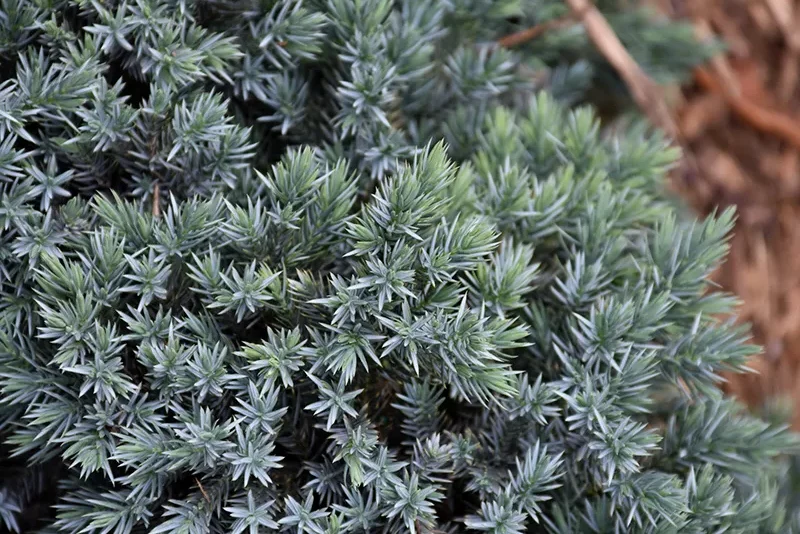Family: Juniper
Type: Shrub
Other Common Name: Singleseed Juniper

Blue Star Juniper, botanically named Juniperus squamata ‘Blue Star’, is a small, slow-growing evergreen shrub. It is renowned for its striking blue-tinged foliage and compact, star-like growth pattern.
This dwarf juniper variety is perfect for adding a splash of color and year-round interest to any garden. Its dense, silvery-blue needles and rounded, mounding habit make it a standout in the landscape.
Thriving in full sun, Blue Star Juniper is hardy in zones 4-8. It prefers well-draining soil and is drought-tolerant once established, making it a low-maintenance choice for various garden settings.
Hardiness Zone: 4a-4a
Pet Friendly: Yes
Moisture Preference: Dry to moist
Sun Needs: Full sun
Drought Tolerance (Xeriscape): Yes
Growth Rate: Slow
Average Height (feet): 3
Average Spread (feet): 4
Average Life Span (years): 30
Form: Round
Foliage Color: Blue
Foliage Shape: Needle
Bark Color: Gray
Bark Texture: Rough
Incorporating Blue Star Juniper into your landscape offers both aesthetic appeal and practicality. Its unique color and shape make it an excellent choice for adding contrast and texture to your garden.
This juniper is ideal for rock gardens, borders, and as a ground cover. Its compact size also makes it suitable for container gardening, adding evergreen interest to decks, patios, or balcony gardens.
Despite its ornamental features, Blue Star Juniper is relatively low maintenance. It’s an excellent choice for gardeners looking for a durable, long-lasting plant with minimal care requirements.
In rock gardens, Blue Star Juniper's compact form and striking color provide a beautiful contrast against the rocks and other plants.
For formal gardens, this juniper's structured growth and unique coloration make it a great accent plant or low-growing hedge.
In contemporary garden designs, Blue Star Juniper fits perfectly. Its modern form and eye-catching color complement minimalist and artistic landscapes.
Plant it as a focal point in a small garden bed. Its distinct color and form draw the eye and create a point of interest.
Use it in a container for urban or limited-space gardens. It adapts well to container life, bringing year-round color to small spaces.
Pair it with contrasting foliage plants. The blue of Blue Star Juniper pairs beautifully with green, yellow, or red-leaved plants for a striking contrast.

Select our pre-made garden layouts to create a landscape that’s uniquely yours. Simple, smart, and customizable!
In spring, Blue Star Juniper's foliage brightens, signaling the start of the growing season with its vibrant blue needles.
During summer, the shrub maintains its dense, blue foliage, providing consistent color and texture in the landscape.
In the fall, Blue Star Juniper continues to display its striking foliage, adding interest to the autumn garden.
In winter, Blue Star Juniper stands out with its evergreen needles. Its resistance to winter burn makes it a valuable addition to the cold-season garden.
Blue Star Juniper should be planted in an area with full sun to ensure vibrant foliage color. It’s ideal for open, sunny spots in rock gardens, borders, or as a standalone feature in a yard.
This juniper requires full sun for the best foliage color. It needs at least six hours of direct sunlight daily to maintain its striking blue hue.
Blue Star Juniper is adaptable to a wide range of soil types but prefers well-draining soil. It tolerates dry, rocky soils and is drought-tolerant once established.
Space Blue Star Juniper plants about 2 to 3 feet apart. This allows each plant enough room for growth and maintains good air circulation.
The best time to plant is in the early spring or fall. Cooler temperatures during these periods help the shrub establish roots without the stress of summer heat.
Dig a hole as deep as the root ball and twice as wide. Position the shrub in the hole, backfill with soil, and water thoroughly. Ensure the shrub is planted at the same depth it was in its container.
Water regularly after planting and during dry spells. Mature plants are drought-tolerant but benefit from occasional deep watering.
Fertilize in early spring with a slow-release, balanced fertilizer to support healthy growth. Avoid over-fertilizing, as junipers require minimal nutrients.
Pruning is generally not necessary for Blue Star Juniper but can be done to shape the plant or remove dead branches. Prune in late winter or early spring before new growth begins.
In spring, inspect for any winter damage and prune if necessary. Apply a layer of mulch to conserve moisture and control weeds.
Monitor for pests and diseases during the summer. Water the plant if there are extended periods of drought.
Prepare the plant for dormancy by reducing watering. Clear any debris from around the base to prevent fungal diseases.
Blue Star Juniper is hardy in winter. No special care is needed, but ensure it's not exposed to excessive winter moisture.
Blue Star Juniper typically grows to about 2-3 feet in height and spread, forming a compact, rounded shape.
Yes, Blue Star Juniper is considered deer resistant. Its foliage is not a preferred food source for deer.
Absolutely, its compact size and striking color make Blue Star Juniper an excellent choice for container gardens, adding year-round interest to patios, decks, or balconies.
Sign up below to get exclusive deals, discounts, and new plant collections—delivered straight to your inbox! Plus, stay inspired with the latest gardening tips, landscaping trends, and DIY garden ideas. Start growing with us today!
A big thank you for subscribing to the PBN Design newsletter.
We're thrilled to have you join our community. Get ready for exciting updates, insightful content, and more delivered straight to your inbox.
Stay tuned!
Go backA big thank you for subscribing to the PBN Design newsletter.
We're thrilled to have you join our community. Get ready for exciting updates, insightful content, and more delivered straight to your inbox.
Stay tuned!
Go back